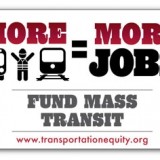The
US-based Transportation Equity Network (TEN) recently released a
common sense proposal for creating jobs in the report More
Transit = More Jobs.
They look at what would happen if about half of the US urban freeway
budget was invested in public transit. Their answer is more jobs for
the same money.
TEN
emphasizes that public transit investment creates more jobs per
dollar than urban freeways and other roads. But they also propose
focusing more on immediate improvements to transit service rather
than resource intensive capital investments such as subway
construction as a way of boosting job creation: “Transit operations
generate more jobs per dollar spent than transit capital spending
because transit operations are more labor-intensive and do not
involve significant non-labor inputs, such as land acquisition or
materials.” This is a very important consideration here in BC,
where operating funds are so tight that Translink had to tie up one
of our three Sea Buses.
The
TEN study analyzed 20 US metropolitan areas and concluded that
shifting half of their highway funds to transit would result in a net
gain of 180, 000 jobs
over five years – with
no new spending. TEN
allies focus on the benefits of transit service,
rather than just the jobs, in promoting the plan to shift money away
from urban freeways.
More
jobs and improved transit for the same money sounds good, but there
are other much more important reasons to shift spending from roads to
transit. In Canada, transportation is the largest and fastest growing
source of the greenhouse gases that cause global warming.
Unemployment may be a serious problem, but the climate
crisis
threatens the very future of human society. As the old bumper sticker
puts it there are ‘No Jobs on a Dead Planet’. Perhaps it should
be updated to ‘No Jobs on a Cooked Planet’.
The
end
of cheap oil
is also a compelling reason to shift resources from freeways to
transit. The present economic crisis and resulting unemployment was
partly triggered by the sharp peak in oil prices in 2007 – 2008.
But this could just be the start of an oil price roller coaster as
oil supplies peak and go into decline. In the near future, oil
dependence could well be a recipe for economic ruin.
Perhaps
the biggest fault with the TEN study is that you could read it and
think that unemployment is the biggest threat to society, and that
peak oil and global warming are just additional reasons to support a
smart job creation strategy. The fact is that we will make big
changes, or circumstance will impose much harsher choices on us.
Given
the end of cheap oil and climate crisis, it is time for an end to
urban roadway expansion. Most of the existing roadway infrastructure
should be kept and maintained well, but the public money now spent on
roadway expansions must be reallocated to transit.
If
you agree that public funds should be shifted from urban freeways to
transit, please consider attending the 10/10/10
Dig in for Climate Justice
on Sunday October 10, 2010.

